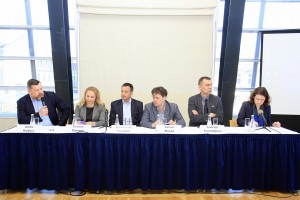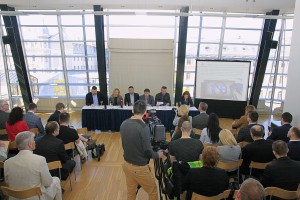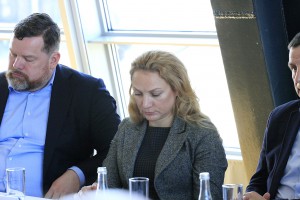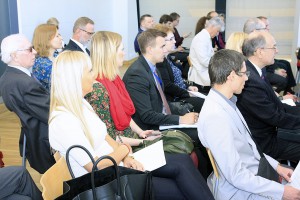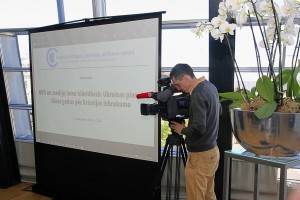Prior to an aggressor country’s attack, the foundation is laid by NGOs and the media, working on political messages. The way for war is paved by spreading the aggressor country’s opinion and position. Thereby, in order to oppose that, it is necessary to set up an institution to perform evaluation of journalists’ activities. War can be avoided if the media act in a professional manner, and NGOs mobilize to create barriers against the other country’s lies and disinformation. Such ideas were stressed in the seminar „The Role of NGOs and the Media in Hybrid War. Ukrainan Experience Two Years after Russian Invasion” held on May 6 by the Centre for East European Policy Studies (CEEPS) with the participation of several Ukrainian experts.
To the opinion of Yevhen Magda, representative of the Hybrid Warfare Resistance Bureau (Ukraine), countries should take into account that hybrid war does not start unexpectedly. In Ukraine, since the presidency of Viktor Yuschenko, pro-Russia NGOs had been carrying out their activities, creating pro-Russia atmosphere in the Ukraine’s Eastern regions and Crimea. And, according to Magda, even in 2005, Russia began to propagate the idea that Ukraine was a failed state. Excessive use of NGOs and the media is one of the characteristic features of hybrid war. To the expert’s opinion, these may be considered as the basic tools of hybrid war, and Russia implements them competently in its own interests. He indicates that many people who were born and grown in the Soviet Union, use the Russian language as the information obtaining means. Russia is aware of the fact, and therefore it saturates the information space with disinformation. He has noticed, for example, that a part of Latvia’s society thinks that there is nothing wrong about the annexation of Crimea. Magda concludes that Russian propaganda snipers have managed to hit the target also here.
According to Tetiana Popova, Deputy Minister of Information Policy of Ukraine, activities of the NGOs, unmasking on daily basis Russian propaganda’s content, are one of the effective means for interruption of Russia’s lies, and she mentions Ukrainian organizations Stop Fake, Info resist and Inform Napalm as the successful instances.
To the opinion of Vyacheslav Gusarov, expert in information security issues at the Center for Military-Political Research of Ukraine and member of the group “Information Opposition”, the goal of information expansion is to maintain control of information of the state against which attack is launched, with the further goal – to take control of its citizens. V.Gusarov explains that information expansion is a body of information activities aimed at creation of new concepts and notions in society with simultaneous increase in aggressor country’s propaganda, creation of information catalysts favourable for the aggressor, attempts to take control of information channels, sending of strong disinformation impulses finally leading to political, economic and even military influence.
To Y. Magda’s opinion, Russia’s manner of action may be compared with the behaviour of termites – using various means, Russia ate up Ukraine’s statehood from inside, expecting that after the annexation of Crimea and stirring up the riots in Donbas Region, Ukraine would collapse, which, fortunately, that has not come true. Y. Magda insists that, using Ukraine’s experience, it is necessary to design mechanisms how to react to Russian propaganda expressions in order to prevent similar Russia’s aggression in the other countries, including the Baltic states.
With the approach to May 9, it should be taken into account that, during this period, Russian media usually present demonstration lesson of information influence. Stories about fascists and a lot of lies can be expected. Magda indicates that tragedy lies in simultaneous lack of truthful stories about the horrible impact of the World War II on Ukrainian, Baltic and the other nations. In his turn, Gusarov stresses that Latvian journalism has to be the Latvian journalism, and it must not copy and reproduce Russian media’s content and ideas.
According to the CEEPS’s Executive director Andis Kudors, Russia’s activities distort the political process in Latvia. That poses threat to the state of Latvia. Similar to Ukraine, also in Latvia, NGOs and the media have strong influence. Therefore, the media monitoring is necessary in order to reduce the risks of information influence.




